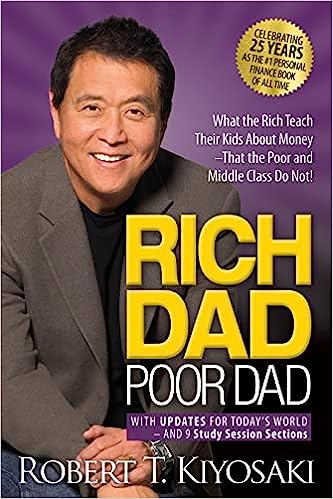 Inglés
InglésRich Dad Poor Dad
Robert T. KiyosakiArrendar
Recíbelo en 24-48 horas arrendado
Cotizar Título
Confirmar Disponibilidad para Compra
"Rich Dad Poor Dad," written by Robert T. Kiyosaki, is a personal finance book that contrasts the financial philosophies and practices of two father figures in the author's life: his biological father (referred to as "poor dad") and the father of his best friend (referred to as "rich dad"). The book imparts valuable lessons about money, investing, and mindset through the experiences and teachings of these two figures.
The "poor dad" represents the traditional path of getting a good education, finding a secure job with benefits, and living within one's means. He emphasizes the importance of working for money and prioritizes job security and a stable paycheck.
On the other hand, the "rich dad" embodies a different approach. He advocates for financial literacy, entrepreneurship, and investing as means to achieve financial independence and wealth. He encourages thinking creatively to create sources of passive income, such as owning businesses or investing in real estate. The "rich dad" also emphasizes the importance of acquiring assets that appreciate in value and generate income, rather than accumulating liabilities that drain money.
Key takeaways from the book include:
Assets vs. Liabilities: The author introduces the concepts of assets (things that put money in your pocket) and liabilities (things that take money out of your pocket). He suggests focusing on acquiring income-generating assets to build wealth.
Importance of Financial Education: The book stresses that traditional education does not necessarily teach people about money and investing. Kiyosaki emphasizes the need to continually educate oneself about finances and investing to make informed decisions.
Mindset Shift: The book challenges the mindset of working for a paycheck and encourages readers to adopt an entrepreneurial mindset. It encourages finding opportunities to create value and generate income independently.
Taking Calculated Risks: "Rich dad" teaches that taking calculated risks is a part of achieving financial success. He advises learning to manage and mitigate risks through education and experience.
Working Smarter: The book promotes the idea of making money work for you through investments and passive income streams, rather than working solely for money.
The Power of Mindset: "Rich Dad Poor Dad" underscores the importance of mindset in achieving financial success. Developing a positive and growth-oriented mindset is crucial to overcoming challenges and pursuing opportunities.
Overall, "Rich Dad Poor Dad" offers readers a new perspective on money, investing, and financial independence. It encourages people to think critically about their financial choices and to consider alternative approaches to building wealth beyond the traditional path of working a job.